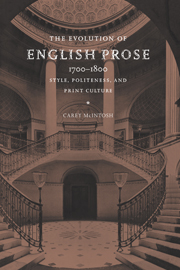Book contents
- Frontmatter
- Contents
- Preface
- 1 The ordering of English
- 2 Literacy and politeness: the gentrification of English prose
- 3 Testing the model
- 4 Loose and periodic sentences
- 5 Lofty language and low
- 6 Nominal and oral styles: Johnson and Richardson
- 7 The New Rhetoric of 1748 to 1793
- 8 The instruments of literacy
- 9 Politeness; feminization
- 10 Style and rhetoric
- Epilogue: language change
- References
- Index
8 - The instruments of literacy
Published online by Cambridge University Press: 18 December 2009
- Frontmatter
- Contents
- Preface
- 1 The ordering of English
- 2 Literacy and politeness: the gentrification of English prose
- 3 Testing the model
- 4 Loose and periodic sentences
- 5 Lofty language and low
- 6 Nominal and oral styles: Johnson and Richardson
- 7 The New Rhetoric of 1748 to 1793
- 8 The instruments of literacy
- 9 Politeness; feminization
- 10 Style and rhetoric
- Epilogue: language change
- References
- Index
Summary
And then he told us such things about verbs, and nouns, and adverbs, that never entered our heads before, and emphasis, and accent; heav'n bless us, I did not think there had been such things in the world.
(Samuel Foote, The Orators: 1762)This chapter deals with three genres that encouraged writtenness in English prose of the second half of the eighteenth century. Grammars, magazines, and dictionaries played a role in the increasingly commercial culture of the period, a key to which was the rapidly growing trade of publishing. A few generalizations about the growth of publishing in the eighteenth century may help to introduce these three “instruments of literacy.”
The eighteenth century saw an extraordinary revolution in publishing and bookselling, one that reflected a rapid assimilation of printed texts of many kinds (not just books) into the daily life of the nation. Terry Belanger's studies of the publishing business between 1695 and 1850 show that “England in the 1790s was a well-developed print society,” whereas in 1695 print culture was still in its infancy. In 1695, except for certain parts of certain towns, the life of the written language for most Britons was what Elizabeth Eisenstein calls “scribal” more than printed. A few hundred professionals took care not only of the printing, but also of the binding, distribution, advertising, and selling of books, mostly in London. By 1790, thousands of people made their living from specialized jobs in the printing world all over Great Britain, and the majority of the population had to deal one way or another with printed texts.
In 1690, writers who wanted to get their manuscripts into print had relatively few options.
- Type
- Chapter
- Information
- The Evolution of English Prose, 1700–1800Style, Politeness, and Print Culture, pp. 169 - 194Publisher: Cambridge University PressPrint publication year: 1998



